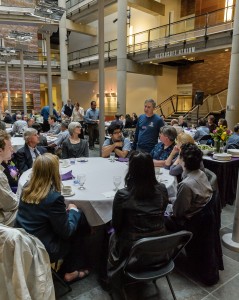 Each of us looks back on a small number of particularly inspirational K-12l or community college teachers who gave us a sense of academic purpose and direction. Each year, UW CSE invites our students to nominate these teachers for recognition. We host the teachers, their partners, and the students who nominated them at a dinner in the Microsoft Atrium of the Paul G. Allen Center for Computer Science & Engineering.
Each of us looks back on a small number of particularly inspirational K-12l or community college teachers who gave us a sense of academic purpose and direction. Each year, UW CSE invites our students to nominate these teachers for recognition. We host the teachers, their partners, and the students who nominated them at a dinner in the Microsoft Atrium of the Paul G. Allen Center for Computer Science & Engineering.
Congratulations and thanks to the 2011-12 UW CSE Inspirational Teachers – and to all of the K-12 and community college teachers who inspire their students and send them on to UW CSE!
Many Bruce Hemingway photographs of the May 10 dinner here. Read more →
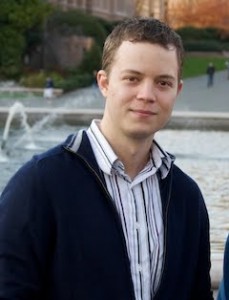 Eric Larson, a Ph.D. student working with UW CSE and EE professor Shwetak Patel, will receive the UW College of Engineering “Student Innovator: Research” Award at the Community of Innovators award celebration on May 29.
Eric Larson, a Ph.D. student working with UW CSE and EE professor Shwetak Patel, will receive the UW College of Engineering “Student Innovator: Research” Award at the Community of Innovators award celebration on May 29.
Eric’s research concerns sensing and signal processing for health care and sustainability applications.
Congratulations Eric! Read more →
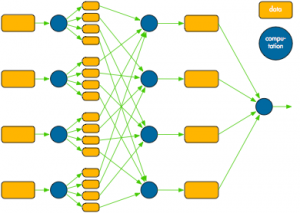 Many thanks to UW CSE alum and Google engineer Shen Lee for running a 3-session MapReduce Bootcamp for UW CSE students. There was overwhelming interest in this 3-evening bootcamp, just concluded. Read more →
Many thanks to UW CSE alum and Google engineer Shen Lee for running a 3-session MapReduce Bootcamp for UW CSE students. There was overwhelming interest in this 3-evening bootcamp, just concluded. Read more →
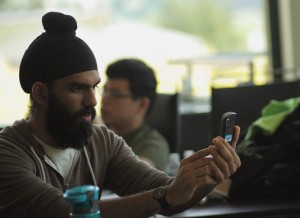 TouchDevelop is a new programming environment for Windows Phone – a typed, structured programming language built around the idea of only using a touchscreen as the input device to author code, with built-in primitives that make it easy to access the rich sensor data available on a mobile device.
TouchDevelop is a new programming environment for Windows Phone – a typed, structured programming language built around the idea of only using a touchscreen as the input device to author code, with built-in primitives that make it easy to access the rich sensor data available on a mobile device.
On Friday and Saturday, 30 UW CSE students participated in a TouchDevelop Hackathon. The event started on Friday evening with a short tutorial about TouchDevelop. Throughout Friday night and Saturday, student teams worked hard and the TouchDevelop team was at hand to answer questions and keep the students going. At the end of the Hackathon, on Saturday evening, there were 14 completed entries. Each project was given three minutes to present and demo. And the Oscar goes to …
First place
Second place
Third place
Congratulations to the winners, and thanks to the other participants and to Microsoft (particularly Judith Bishop, Arjmand Samuel, Peli de Halleux, and Nikolai Tillmann). Read more →
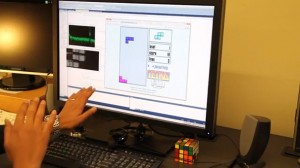 PCWorld writes: “Most gesture-based control systems we use today rely on either motion-capture cameras – like the Kinect – or a touchscreen device. But researchers from Microsoft Research and the University of Washington are developing a system that can detect object with sound waves, like how a bat does with echolocation. With the SoundWave project, the researchers aim to bring gesture controls to any computer that has a set of speakers and microphone. The program uses the Doppler Effect of sound waves for to detect objects and recognize motion.” Read the PCWorld article here.
PCWorld writes: “Most gesture-based control systems we use today rely on either motion-capture cameras – like the Kinect – or a touchscreen device. But researchers from Microsoft Research and the University of Washington are developing a system that can detect object with sound waves, like how a bat does with echolocation. With the SoundWave project, the researchers aim to bring gesture controls to any computer that has a set of speakers and microphone. The program uses the Doppler Effect of sound waves for to detect objects and recognize motion.” Read the PCWorld article here.
ExtremeTech writes: “Microsoft Research, working with the University of Washington, has developed a Kinect-like system that uses your computer’s built-in microphone and speakers to provide object detection and gesture recognition, much in the same way that a submarine uses sonar.” Read the ExtremeTech article here.
Geekosystem here.
Slashdot coverage here.
SoundWave is a collaboration involving Sidhant Gupta and Shwetak Patel from UW CSE, and Dan Morris and Desney Tan from Microsoft Research. Read more →
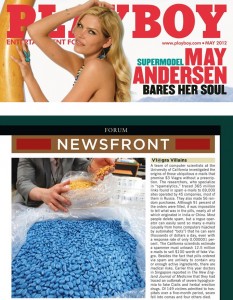 This is what happens to UW CSE Ph.D. alums who do research on the spam value chain using fake viagra sales as their case study.
This is what happens to UW CSE Ph.D. alums who do research on the spam value chain using fake viagra sales as their case study.
Page 45 of the May issue, here.
[In a followup to this post, Savage notes: “Now, one might suggest that there is a trend among UW CSE Ph.D. alums on the UCSD faculty, given Sorin Lerner’s 2010 recognition by the adult entertainment industry. As Yoshi might say, ‘Interesting!’ However, I can assure you that this kind of press is just a natural byproduct of hard work and a firm dedication to science.”] Read more →
 OK, we admit it – it’s not news. But how can you not love this UW-themed hot dog????? (From a collection of Seattle PI photographs of the May 5 “Opening Day” (of the boating season) activities on the Montlake Cut.) Read more →
OK, we admit it – it’s not news. But how can you not love this UW-themed hot dog????? (From a collection of Seattle PI photographs of the May 5 “Opening Day” (of the boating season) activities on the Montlake Cut.) Read more →
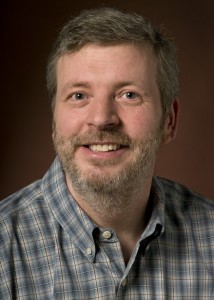 CSE’s Stuart Reges has been elected to the Board of Directors of the Computer Science Teachers Association, as one of two “University Faculty Representatives.” CSTA is a national organization that supports and promotes the teaching of computer science in K-12.
CSE’s Stuart Reges has been elected to the Board of Directors of the Computer Science Teachers Association, as one of two “University Faculty Representatives.” CSTA is a national organization that supports and promotes the teaching of computer science in K-12.
Stuart has a long record of engagement with both the national CSTA organization and the Puget Sound chapter, PS CSTA.
Learn more about UW CSE’s K-12 outreach activities – DawgBytes – here. Read more →
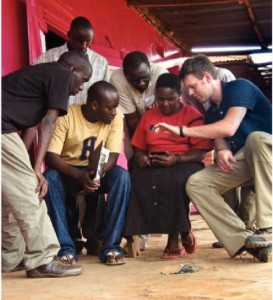
UW CSE's Carl Hartung, a developer of Open Data Kit - which the Grameen Foundation uses to create apps for its project in Uganda - trains a Community Knowledge Worker.
The feature article in the most recent Alaska Airlines flight magazine, “Data Delivery: Researchers tap the potential of mobile technologies to gather and interpret information,” contains an extensive discussion of UW CSE’s “Open Data Kit,” an open source toolkit that turns mobile phones into data collection devices.
Read the article here. Read more →
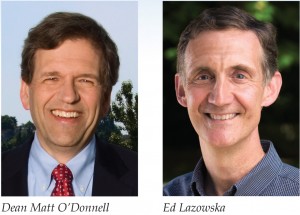 UW’s Trend in Engineering interviews UW CSE’s Ed Lazowska and UW Dean of Engineering Matt O’Donnell regarding the impact on students and employers of the longstanding failure to invest in engineering capacity at the University of Washington.
UW’s Trend in Engineering interviews UW CSE’s Ed Lazowska and UW Dean of Engineering Matt O’Donnell regarding the impact on students and employers of the longstanding failure to invest in engineering capacity at the University of Washington.
“‘It’s heartbreaking,’ said Ed Lazowska, the Bill & Melinda Gates Chair in Computer Science & Engineering. ‘We are turning away outstanding students who would absolutely succeed in the program. It’s depriving students of the preparation they need, and it’s depriving employers of the employees they need.’ …
“‘Engineering education is booming because of the preparation it gives students. That preparation is teamwork, interdisciplinary projects and problem solving, and a connection to the real world. Engineering education has become more hands on and experiential in recent years. The value that we add is in the lab, and that pervades all engineering fields. All the upper division courses have a significant lab component.’ …
“‘Our economy is creating great jobs and they are going to other people’s kids. Every smart, motivated kid who grows up here ought to have the opportunity to become a first-tier participant in this new economy. That is not the case today because of lack of capacity.’ …
“‘The nation’s great public universities provide socioeconomic upward mobility for the smart kids who grow up in their regions. The UW enrolls more Pell-Grant-eligible (economically disadvantaged) students than the entire Ivy League combined. We cannot sacrifice that mission.'”
Main article here. Q&A here. Read more →
 Each of us looks back on a small number of particularly inspirational K-12l or community college teachers who gave us a sense of academic purpose and direction. Each year, UW CSE invites our students to nominate these teachers for recognition. We host the teachers, their partners, and the students who nominated them at a dinner in the Microsoft Atrium of the Paul G. Allen Center for Computer Science & Engineering.
Each of us looks back on a small number of particularly inspirational K-12l or community college teachers who gave us a sense of academic purpose and direction. Each year, UW CSE invites our students to nominate these teachers for recognition. We host the teachers, their partners, and the students who nominated them at a dinner in the Microsoft Atrium of the Paul G. Allen Center for Computer Science & Engineering.









